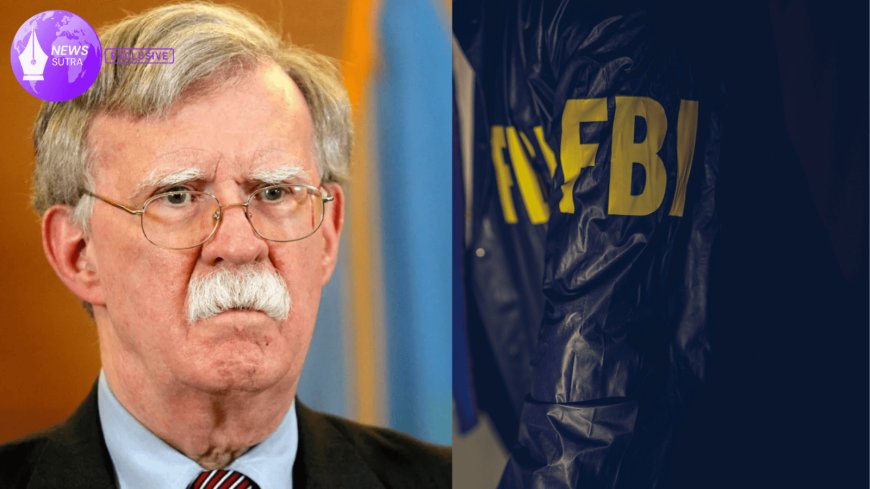FBI Raids John Bolton’s Home: Unraveling the National Security Leak Investigation
The FBI’s search of John Bolton’s home ties into broader investigations of U.S. national security leaks. Explore expert analysis, timelines, and implications.

WASHINGTON, D.C. — Federal agents searching the home of former National Security Advisor John Bolton has ignited a firestorm of speculation about the scope of ongoing investigations into national security leaks. While the Justice Department has not confirmed the precise nature of the inquiry, the raid suggests a widening probe into potential disclosures of classified intelligence at the highest levels of government.
The Search and Its Context
Sources familiar with the operation told NewsSutra that FBI agents executed a warrant late last week at Bolton’s residence, carefully reviewing electronic devices and paper records. According to officials, the warrant was linked to “unauthorized disclosures of protected national security information.”
Bolton, who served under former President Donald Trump before departing amid sharp policy disagreements, has long been a polarizing figure in Washington. His candid memoir, The Room Where It Happened, drew scrutiny over its use of classified details, though the Justice Department previously declined to pursue charges.
A Timeline of Leaks
This latest development must be seen against a backdrop of escalating concerns about national security breaches:
-
2017–2019: Investigations into unauthorized intelligence sharing during Trump’s first term intensified, with multiple probes into Russia- and Ukraine-related disclosures.
-
2021–2023: A series of leaks involving cyber operations against adversaries like Iran and China placed U.S. counterintelligence agencies on high alert.
-
2024–2025: Analysts flagged a surge in classified material appearing in foreign state-backed media, raising suspicions of insider involvement.
The Bolton search appears to be one piece of a larger puzzle. Experts caution that high-profile targets like Bolton may be connected indirectly through networks of staffers, contractors, or intermediaries.
Expert Analysis: A Cybersecurity Angle
Cybersecurity specialists believe the investigation signals a shift in how the U.S. government treats insider leaks.
“Today’s leaks are not just whispered conversations or stolen files. They’re digital footprints—emails, encrypted chats, and metadata trails,” said Dr. Laura Mendelson, a senior fellow at the Center for Strategic and International Studies. “When an investigation reaches someone like John Bolton, it indicates the FBI is mapping entire ecosystems of communication, not just isolated incidents.”
A review of recently declassified documents shows the U.S. intelligence community warning of “heightened vulnerability to politically motivated disclosures,” particularly in moments of sharp partisan division.
Bolton’s Response
Bolton, in a brief statement, denounced the raid as “a politically charged fishing expedition” and insisted he has “never improperly disclosed classified material.” His attorneys signaled they would challenge any attempt to seize communications protected under attorney-client privilege.
Still, officials within the intelligence community stress that the search was approved through judicial oversight and was not undertaken lightly.
Broader Implications for National Security
The Bolton raid is emblematic of a larger crisis: the difficulty of balancing transparency, political accountability, and the secrecy needed to safeguard intelligence operations.
National security attorney Mark Zaid, who has represented whistleblowers, said:
“The Bolton case highlights the blurred lines between political memoirs, protected disclosures, and criminal leaks. What may seem like political speech can cross into unlawful disclosure if it reveals sources or methods.”
If proven, these breaches could endanger covert operations and allied partnerships, particularly in Eastern Europe and the Middle East.
Historical Parallels
The raid also recalls past controversies:
-
The Pentagon Papers (1971) tested press freedoms versus national security.
-
The Chelsea Manning leaks (2010) and Edward Snowden revelations (2013) reshaped the public debate over surveillance.
Bolton’s case, however, stands apart because it involves a former top national security advisor, not a mid-level analyst or contractor. The stakes, experts argue, are therefore far higher.
What Happens Next
For now, the FBI’s findings remain sealed. Should charges emerge, they could reshape Washington’s legal understanding of how far former officials may go in speaking publicly about their tenure.
Congressional leaders, already consumed with election-year politics, are closely watching. “This is not about one man,” said Rep. Michael Turner (R-Ohio), chair of the House Intelligence Committee. “It’s about whether America can still protect its secrets in a deeply polarized age.”
The Department of Justice is expected to release limited details in the coming weeks, but sources caution the investigation is likely far from over.











